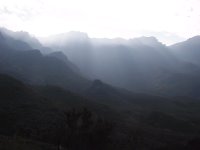Black Gold of the Sun

Here's one by Lessa Josselyn, another welcome newcomer to TKR, on Black Gold of the Sun by Ekow Eshun. Lessa tells me that her interest in the subject transcends the mere professional: she will soon be traveling to Ghana herself. - RD
For those of us in our twenties, attempts to understand ourselves often start with others, beginning where we began, illuminating the upstairs rooms and back gardens of our families and the homes that witnessed our upbringing. In his recent memoir Black Gold of the Sun: Searching for Home in Africa and Beyond, Ekow Eshun explores the flats of London and the village homes of Accra, Ghana, in an attempt to explain what he himself has yet to discover – a history and heritage he is unwilling to claim and unable to interpret. His struggle to do so is both the work’s greatest frustration and its ultimate redemption.
Before the second page, Eshun’s thesis is clear: “who you are is determined by where you are.” As the child of Ghanan diplomats buffeted by coups, appointments and, ultimately, chosen exile in London, place is of utmost importance to Eshun and his siblings. The return to Ghana which starts his novel is therefore not surprising, nor is the pilgrimage to one’s home country a unique form for memoir. And, while Eshun’s location is fascinating – the streets of Accra and costal towns of Northern Ghana have stories to tell – he is not quite comfortable with the words needed to tell them.
Eshun’s expositions on the London of his youth are clear and touching as he delves into themes like the uncertainty of childhood and the realization that we are individuals distinct from our parents, their decisions nevertheless affecting our geography and psychology. As he leaps to present day Ghana, however, his frustration with the society, what it represents as it is torn between a hip-hop culture imported from the West and the ancestral traditions he seeks, makes for slightly disjointed reading. It is as if Eshun expected to find a truth among the population of Ghana – a definition of what it means to be Ghanan that could fill the gaps in his own understanding of himself.
What he finds instead is a culture of contradictions. There are the fortresses of Elmina, which saw the backs of a fifth of the slaves shipped out of Africa. There is Eshun’s family home, built by his great-grandfather with the monies brought in from slave-trading. There is the influx of Westernization – the fashions of Sean Jean and the music of Tupac Shakur. What is more, the anti-American actions of Osama Bin Laden are celebrated alongside W. E. B. DuBois’ renouncing of his American citizenship.
If Eshun discovers anything, it is this: there is no singularity in truth – for Ghana or for himself.
In the final two chapters of the work, the freedom Eshun allows Ghana, and himself, liberates his story – both are allowed to be more than any one thing, to exist in the celebration of their contradictions. Here he writes with a clarity of vision that is lovely in its forgiveness.
I found myself wishing that Eshun had returned to the earlier chapters of his book after this important self-discovery. His direction, vision and exposition in the second half of the novel would have helped edit and clarify the first half’s frustrated stabs into the dark. Of course, such a cleanup may have taken away from the memoir’s resolution. How would we know whether Eshun found himself if we could not see how lost and confused he had been?
The texture of this novel, the obvious research he put into his subject matter and the honesty with which the story is told make Black Gold worth reading – perhaps all the more so as a reminder that we needn't have all the answers to who we are or whence we came at our fingertips, that there is beauty and value in working to discover them.
- Lessa Josselyn


4 Comments:
Lessa: bravo. I think your review reads and flows rather well. Where have you been all these years? What took you so long to write?
So, does the author find the "home[s]" he seeks, or does he find, to quote Bob Dylan, that there is "no direction home"? In any case, what for him constitutes a "home"?
Searching places, not people, for a sense of self. Regardless of where you search, it's not easy. As the director of the movie "The Seventh Continent" remarked, it is not always a good feeling to realize something about one's self.
To chime in: Finding one's self in a "place" is quite difficult, particularly as Lessa's say, in your 20s. We have notions of what a "place" is, but at such a stage of life, we come to realize that all "places" are filled with contradictions. The "place" I grew up in, is no longer the "place" it was, which logically makes me wonder whether it ever actually was the "place" I remember, or if that "place" in my memory was simply a fiction of my childhood mind.
And I accept the foul for flagrant use of the word "place" with quotation marks...
so, my blog is now up...maybe I will send a review this way sometime soon. Something contemporary would be nice. How about Mark Salzman's "Lying Awake"?
Post a Comment
<< Home